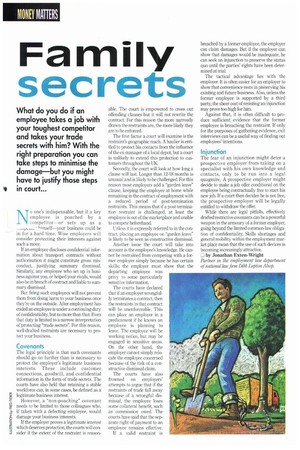Family secrets
Page 63

If you've noticed an error in this article please click here to report it so we can fix it.
What do you do if an employee takes a job with your toughest competitor and takes your trade secrets with him? With the right preparation you can take steps to minimise the damage—but you might have to justify those steps in court...
No one's indispensable, but if a key employee is poached by a competitor—or sets up as a mself—your business could be in for a hard time Wise employers will consider protecting their interests against such a move.
If an employee discloses confidential information about transport contracts without authorisation it might constitute gross misconduct, justifying summary dismissal. Similarly-, any employee who set up in business against you, or helped your rivals, would also be in breach of contract and liable to summary dismissal.
Rut firing such employees will not prevent them from doing harm to your business once they're on the outside. After employment has ended an employee is under a continuing duty of confidentiality, but no more than that. Even that duty is limited to a narrow interpretation of protecting "trade secrets". For this reason, well-drafted restraints are necessary to protect your business.
Covenants
The legal principle is that such covenants should go no further than is necessary to protect the employer's legitimate business interests. These include customer connections, goodwill, and confidential information in the form of trade secrets. The courts have also held that retaining a stable workforce can, in some cases, be defined as a legitimate business interest However, a "non-poaching" covenant needs to be limited to those colleagues who, if taken with a defecting employee, would damage your business interests.
If the employer proves a legitimate interest which deserves pmtection, the courts will consider if the extent of the restraint is reason
able, The court is empowered to cross out offending clauses but it will not rewrite the contract. For this reason the more narrowly drawn the restraints are, the more likely they are to be enforced, The first factor a court will examine is the restraint's geographic reach. A haulier is entitled to protect his contacts from the influence of the ex-manager of a local depot, but a court is unlikely to extend this protection to customers throughout the UK.
Secondly, the court will look at how long a clause will last. Longer than 12-18 months is unusual and is likely to be challenged. For this reason most employers add a "garden leave" clause, keeping the employee at home while remaining in the contract of employment with a reduced period of post-termination restraints. This means that if a post-termination restraint is challenged, at least the employee is out of the marketplace and unable to compete beforehand.
Unless it is expressly referred to in the contract, placing an employee on "garden leave" is likely to be seen as constructive dismissal.
Another issue the court will take into account is the employee's knowledge. He cannot be restrained from competing with a former employer simply because he has certain skills; the employer must show that the departing employee was privy to some particularly sensitive information,
The courts have declared that if an employer wrongfully terminates a contract, then the restraints in that contract will he unenforceable. This can place an employer in a predicament if he knows an employee is planning to leave, The employee will be working notice, but may he engaged in sensitive areas. On the other hand, the employer cannot simply relocate the employee concerned because of the risk of a constructive dismissal claim.
The courts have also frowned on employers' attempts to argue that if the restraints of trade fall away because of a wrongful dismissal, the employee loses some collateral benefit, such as commission owed. The courts have said that the separate right of payment to an employee remains effective.
If a valid restraint is breached by a former employee, the employer can claim damages. But if the employer can show that damages would be inadequate, he can seek an injunction to preserve the status quo until the parties' rights have been determined at trial.
The tactical advantage lies with the employer. It is often easier for an employer to show that convenience rests in preserving his existing and future business. Also, unless the former employee is supported by a third party, the sheer cost of resisting an injunction may prove too high for him.
Against that, it is often difficult to produce sufficient evidence that the former employee is breaching the restraint. If only for the purposes of gathering evidence, exit interviews can be a useful way of finding out employees' intentions.
Injunction
The fear of an injunction might deter a prospective employer from taking on a specialist with his own knowledge and contacts, only to be run into a legal quagmire. A prospective employer might decide to make a job offer conditional on the employee being contractually free to start his new job. If a court then decides he is not free, the prospective employer will be legally entitled to withdraw the offer.
While there are legal pitfalls, effectively drafted restrictive covenants can be a powerful weapon in the armoury of a former employer, going beyond the limited common-law obligation of confidentiality. Skills shortages and general mobility within the employment mar. ket place mean that the use of such devices is becoming increasingly attractive.
E by Jonathan Exten-Wright Partner in the employment law department of national law firm Dibb Lupton Alsop.




























































































































